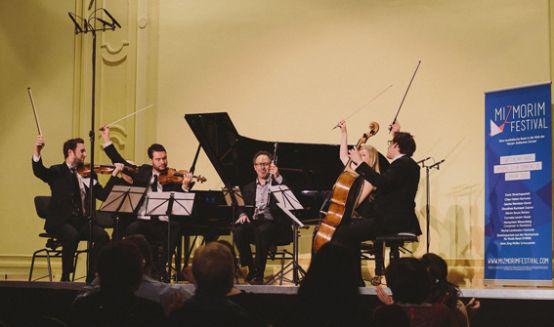Making the forgotten audible
On January 17 and 18, 2015, the first edition of a new festival dedicated to Jewish music took place in Basel's Hans-Huber-Saal. This year's focus was on the "New Jewish School".

"The Mizmorim Festival owes its name to biblical songs and psalms, the Mizmorim, which represent the musical form of prayer and the exchange of ideas in the Jewish faith." This is how the website explains it www.mizmorimfestival.com. A group of dedicated musicians led by the renowned clarinettist Chen Halevi, with the active support of the Jewish Community of Basel, realized a high-quality, enjoyable music festival with music worth listening to.
In his welcoming address, the President of the Jewish Community of Basel, Guy Rueff, who is also the festival's Chief Financial Officer, hoped that Mizmorim would have the same significance for Jewish music in Basel in a few years' time as the Swiss Indoors has for tennis: "Everyone started small once." - This statement suited the modest audience attendance, but not the performance, which deserved a much larger audience.
The "New Jewish School" as a national style
While the national schools of music in Russia, the Czech Republic, Spain and Norway, for example, were able to develop unhindered and take root in the cultural consciousness, the development of the Jewish school was forcibly ended after just three decades, first by Stalinism and then by National Socialism. In 1908, Jewish composers began to take an interest in the sources of their music - as a result of the newly awakened national consciousness that was consolidated at the first Zionist Congress in Basel in 1897. Russia became the center of the Jewish national movement in music. The "Society for Jewish Folk Music" was founded in St. Petersburg. At the beginning, the focus was on collecting, editing and publishing Jewish folklore. Hundreds of concerts at home and abroad, readings and ethnological expeditions were organized. Many composers were given a platform to present their works. In the first phase, the composers Joseph Achron, Michail Gnesin, Alexander and Grigori Krejn as well as Alexander Weprik played an important role. At the end of the 1920s, the company's headquarters were moved to Moscow. Increasingly imbued with communist ideas, it had to cease its activities in Russia completely at the end of 1929.
In the meantime, however, activities had spread throughout Europe and also to Switzerland. Vienna became the new center. The most important composers here were Israel Brandmann, Joachim Stutschewsky and Juliusz Wolfsohn. In 1938, it was finally National Socialism that prevented the groups from continuing to exist. Stutschewsky fled to Switzerland and, on the eve of the Second World War, organized concerts of Jewish music in Zurich and Basel together with his friend and fellow musician Alexander Schaichet. As Russian Jews, the two had already been forced to flee to Switzerland for the first time in 1914. While the violinist Schaichet established himself in Zurich, Stutschewsky went to Vienna in 1924. The two had already performed a number of concerts during this first stay.







